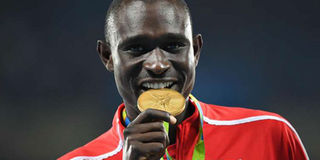Rudisha and fellow Kenyan Olympic champions are truly great

Runner David Rudisha celebrates on the podium for the men's 800m race in the athletics event at the 2016 Summer Olympics at the Olympic Stadium in Rio de Janeiro in Brazil on August 16, 2016. PHOTO | JOHANNES EISELE | AFP
What you need to know:
What David Rudisha and the other great champions have proved at 2016 Summer Olympics that Kenyans do not need drugs to win races.
Ezekiel Kemboi should be a happy man knowing that behind him is a limitless pool of talent – he was beaten by a 22-year-old who will likely dominate that race for years to come.
I love David Rudisha, the 800 metres Olympic champion. His race in Rio this week reminded me of his performance in London in 2012: smooth, consistent, and brutally indomitable at the finish. His total control of the race can only be compared with Usain Bolt in the 100 metres.
I like the fire in his eyes as he triumphantly crosses the line. But I also see the furtive highlights of fear and uncertainty lurking deep inside. The outpouring of joy and a sense of massive triumph is born of that fear and uncertainty. It is not the kind of thing that you will see in Bolt.
But it is the reason I think Rudisha is a truly great champion and potentially a great man. Truly great men are easy to understand and here I am not talking about the minnows who have acquired great wealth or career success through cheating, selfishness, and greed. Great men have huge confidence in their ability, single-mindedly convinced of the rightness of the course they chart, but they are also aware that they can fail if they relax. It is the fear of failure, an acknowledgement of fallibility, that makes them more accepting of frailty in others and keeps them awake at night. It is what humility is all about.
And greatness shines through at moments of triumph and success. It is easy to be humble when you are broke, been left by your wife, your children need rehab, and your in-laws are suing you for back dowry. Weak men are known by their mismanagement of success. Their preening, display of possessions, disdain for those who are not as successful as they are, and a tendency to imagine that the sun rises for the sole purpose of warming their proud bones are all markers of minnows doing well.
ALWAYS PUZZLED
Growing up in Siakago Boys School, I was always puzzled and fascinated by the change that came over my friends when they became prefects. There are those who changed to conform to what they thought was the expected demeanour of someone in authority: they held themselves stiffer, spoke in more gravelly tones, stopped horsing around.
And then there were the minnows who merely wore airs and started conducting themselves like drag queens in ghastly, village approximation of “posh”.
In my recent travels in the Rift Valley, I was in the same pub (my travels have a lot to do with bars, it would appear) with a track star. I always chat up important, newsworthy people; it is my job do so. But this man, sitting on his own at the counter, fiddling with an array of smartphones, the way he avoided eye contact and kept his gaze lowered, his body language, it is as if he had strung razor wire around him.
He is a good champion but he will not inspire in me the same outpouring of admiration as Rudisha, who my colleagues tell me takes the matatu to the stadium for training just to spare the feelings of his bosses and others who cannot afford a gleaming juggernaut.
I respect and admire all these champions even more for their great performances despite being managed by hyenas and operating in a world where everyone thought that they needed drugs to run.
What Rudisha and the other great champions have proved at this Olympics is that Kenyans do not need drugs to win races. And Ezekiel Kemboi should be a happy man knowing that behind him is a limitless pool of talent – he was beaten by a 22-year-old who will likely dominate that race for years to come.
They brought us pride and honour when sports officials have brought the country shame and gluttony.
***
When I was a little boy, I was obsessed with fishing even though I caught nothing and I cannot stand fish of any description. I was also a great fighter for, along with my brothers, a massive delicacy called mung’aru in my tribe. This is the hard crust that forms between the sufuria and ugali. Boys could not have enough of it.
Its division used to require the application of the entire mathematical set: ruler, set square, and protractor.
Some of these naughty habits persist in old age and you will find some middle-aged men, and I shall not name names, fighting for mung’aru with their sons so often that it should become an Olympic sport.
The reason I am providing this background is a definition of wage slavery provided by a colleague of mine who is given to flashes of wit. He says you will know you are not free when you have to take a call from your boss even when your mouth is full of mung’aru, which they call mukaro where he comes from.
I can see in my mind’s eye a man whose mouth is stuffed with mung’aru putting his uneaten crust back on the plate – to the horrified delight of his protractor-wielding sons – to dive for his phone and sob “yes sir, yes sir” into it, amid swallowing efforts.
Wage slaves are great. Life is not a beach for them, but they make the world go round.
[email protected]; Twitter: @mutuma_mathiu





